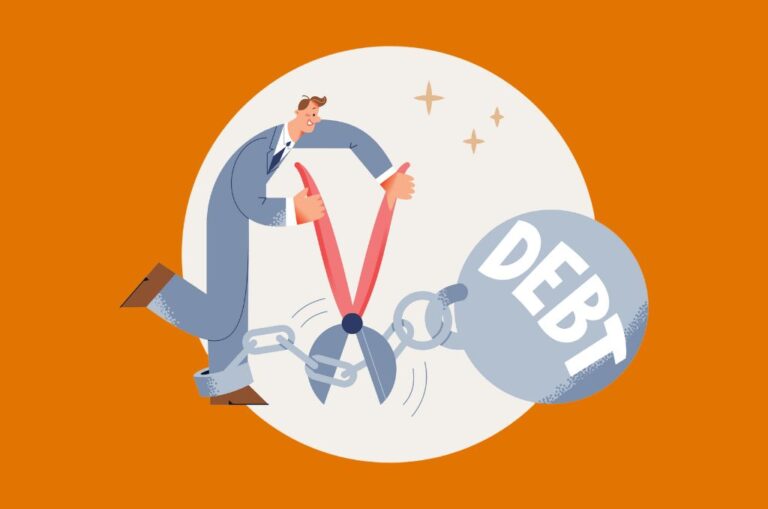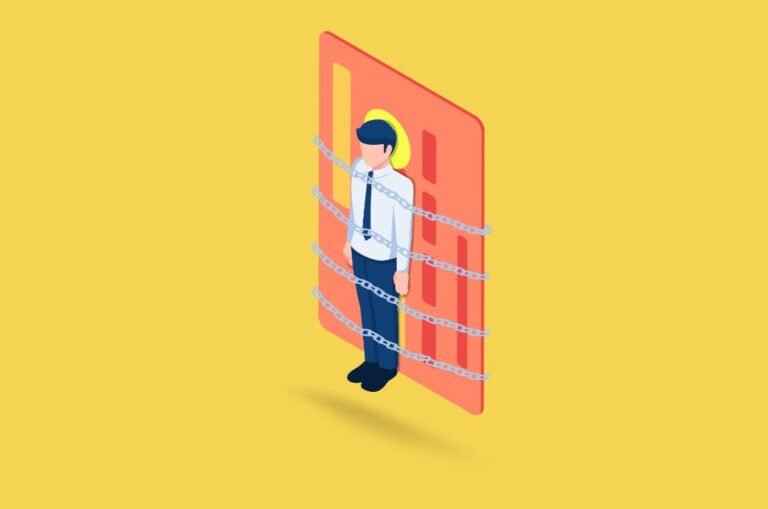Key Takeaways:-
- Debt is borrowing money and repaying on a later date.
- Credit score gets affected because of bad debt or unpaid debt.
- Debt snowball and debt avalanche are one of the best debt repayment strategies.
- Bankruptcy is always the last resort.
Wouldn’t life be all rainbows if there was no credit taken and debt accumulated? But there aren’t a lot of rainbows, are there? Why wait for a rainbow when you can create your own? Yes. Payoff debt fast and enjoy your income just as your rainbows. Be it for whatever reason you took debt, but if you are waiting around for the right time to pay off debt, that time is now. Please don’t wait around for your debt to accumulate more interest than it already has, and pay more to your lenders. Rather, pay off debt fast and get your life rolling the way you wish.
What Is Debt?
But because you are here to start your journey of paying off debt, it is important to understand what debt is. So, debt refers to borrowing a sum of amount from lenders, which comes at a certain interest rate for a specific time until the debtor repays the debt to the creditor.
Why Must You Payoff Debt?
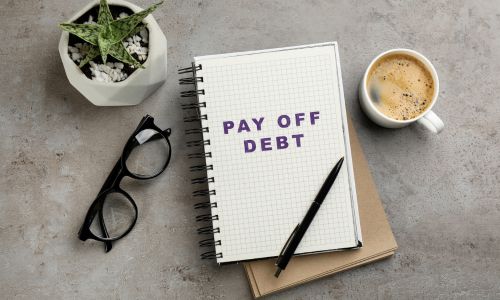
Of course, not all of your debts need to be paid off in the quickest minutes. But it is necessary to pay off debt for quite a few reasons. And it shouldn’t matter when you actually decide to pay off your debts or in which order; paying them all off should be on your to-do list. If you have good debt which gets you a lower interest rate every month, it might help you to build your wealth. But if it is the Red Flag – BAD DEBT, it is time to break up right now.
You must pay off your bad debt for the following reasons:
- Debt can have a negative influence on your finances and your credit score.
- You can use the funds for payments of debts and interest payments in investing or savings.
- You have extra bills to pay, even when you aren’t actually using any services materialistically.
- If you have bad debt or unsecured debt, you will be subjected to the lender’s choice of interest rate, and that has a toll on your financial and even mental health.
- Paying off debt will have a positive impact on your credit score.


How Paying Off Debt Will Affect Your Credit Score?
It might be noticed that just right after you pay off debt, your credit score might not show any positive changes, but believe the process. As soon as your paid-off balances are reflected in your credit history, you will realize the effect it has on your credit score. You should be seeing a positive bump in your credit score, for as long as you are responsible.
Of course, paying off debt will bring a rise in your credit score. Still, if you pay off the entire credit card and then even close the account, your credit score will again dip because the closing of the credit card account results in a reduction of the amount that is available to you as the credit. Because of this, your credit utilization ratio( it is the amount of revolving credit that is used in comparison to the overall limit of credit) will see a rise and again injure your credit score.
So, as a responsible credit card holder, you should keep your credit score up to the mark. Hence, you would want to pay off the credit card but keep the credit card still working. But it would be smart to use it very rarely. This way, you will receive a benefit from your credit limit, but you won’t be accumulating more debt.
How Much Debt Do You Have?
Considering the economy and market system we operate in, you may have multiple debts. And it can be confusing to know in total how much debt you have. But it is important to know exactly how much you are in debt. Because then you could choose the correct strategy to pay off debt. You can know about the debt owed by the debt-to-income ratio.
Debt to debt-to-income ratio equals monthly debt payments divided by monthly income earned. It is necessary to have a good debt-to-income ratio because your creditors would want to look at it while they are giving you debt. If your debt-to-income ratio is higher than it should be, your credit cards, mortgages, or any other loans might face some difficulty in approvals.
Example:
Let’s meet Sally. She has a monthly income of $5500. She has student debt of $600/month along with a car loan of $500/month, credit card debt of $500/month and a mortgage with $1000/month in payments. Which brings the total of payments every month to $2600. Thus, your debt-to-income ratio is 47%.
Which Debt To Pay Off First?

You can select a strategy to pay off debt, but it is important to decide on which debt to pay off first. It is common to be confused about the sequence in which you should be paying off your debt but maybe you can make a wise choice.
You can look at the factors such as Annual Percentage Rate (APR). The higher the APR, the first you pay it. APR is equal to borrowing cost, which is a sum of interest rate and fees in the account. You can also take into account the outstanding balance. You can decide on the loan with more outstanding balance to be paid first. Thus if there is a loan which has the highest APR and the most amount of outstanding balance, you can pay that debt first.
Majorly some debts have more APR than the rest, and hence, you could pay in a sequence like the following or similar:-
- Credit Card Debt
- Student Loan Debt
- Auto Debt
- Mortgage Debt
- Medical Debt
- Tax Debt
Strategies To Pay Off Debt
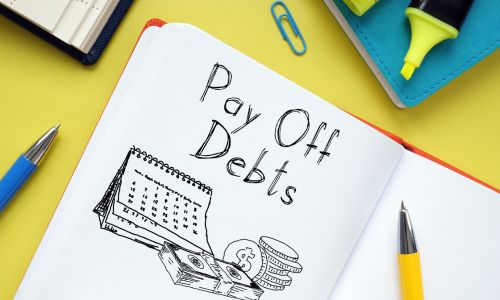
Debt Snowball
Method: In this debt payoff strategy, you pay off the least amount of debt first, then make payments for the higher debts. This way, when you pay off your lowest amount of debts, you will see that the total number of your debts has reduced. Remember, while you are aiming to pay off the least amount of debt first, you are still making minimum payments to all of your debts because you wouldn’t want to default.
Drawback: You might accumulate more interest on the higher amount of loan since you will be paying them off later.
Debt Avalanche
Method: In this debt payoff strategy, you pay off the most amount of debts first, then make payments for the lower debts. This way, when you pay off a higher amount of debt, you have debts with lower interest rates left, and so you pay less in interest over time. Remember, while you are aiming to pay off high-interest-rate debts first, you are still making minimum payments to all of your debts because you wouldn’t want a late fee on any of them.
Drawback: The speed of paying off debts is lower since you would be paying the highest interest rate debt first.
Debt Consolidation
Method: In this debt payoff strategy, you pay off different debts through one monthly payment. This method helps you to group your high interest debts into one monthly payment, preferably to a lower interest rate. This method brings with it lower interest rates (mostly), along with managing your debt payments better and assists you in lessening the time of complete debt payoff. You can even get help from debt relief companies like Accredited Debt Relief if you are new to debt consolidation. They can also help you save bucks while consolidating your debts for you.
Drawback: You might not always lower the interest rate. You will require a good credit score to consolidate your debts.
Debt Management
Method: In this debt payoff strategy, you pay off after your credit counselors help you negotiate debts with your creditors and finalize a plan which you can afford to pay. It basically simplifies your debt repayment, and with this, you will have only one payment every month for your debts. Usually, your monthly payment amount or fee waivers are negotiated by the credit counselors.
Drawback: The amount of the debt majorly remains the same as credit agencies do not negotiate those.
Debt Fireball
Method: In this debt payoff strategy, you pay off through a hybrid method of debt snowball and debt avalanche. In this method, you divide your debts as good and bad debts. Good debts are the ones that assist you to build wealth or your future and have lower interest rates while bad debts are the ones which don’t help you save and have higher interest rates.
You list bad debt as smallest to largest according to the balance size. Again, you make minimum payments to all debts but most payments to the smallest bad debt. After all the bad debts are mad, you could start with good debts.
Drawback: The amount of interest rates for the higher debts may accumulate overtime since you will be paying them off later.
Debt Repayment Options
Balance Transfer
You can opt for a balance transfer if you have a good credit score. You can use this repayment option to transfer balance among credit cards. You could transfer the credit card’s balance with a high-interest rate to a credit card with a lower interest rate. It is useful if you are able to pay most of the debts in the promotional period of the balance transfer. After the promotional period is over you would incur 3 to 5 percent in fees.
Personal Loan
You can take a personal loan and use that loan to pay off the existing debts. This is a way to consolidate your debts since after you pay off multiple debts with one debt, you will have only one monthly payment. If you have a good credit score, you could get a personal loan at a lower interest rate than your other debts.
Debt Settlement
You can settle your debt if you have over-the-top debt, especially through credit card debt. You can try debt relief companies like National Debt Relief to help you negotiate with your creditors. NDR handles unsecured debts and hence can assist you in settling credit card debts. Negotiating is a skill, and you might require experienced negotiators like NDR. However, there is a chance that the creditors do not agree to the negotiation exception in the case when the lender knows that the borrower can not pay the debt in full.
Debt Snowflake
This repayment method can be put to use as a subsidiary of any other debt repayment strategy or method. Snowflakes are basically free and found money which you put to use in your debt repayment. This free and found money could be work bonuses, cash as birthday gifts, rebates and any other extra money. This will help you to pay the debts quicker and hence pay less in interest rate.
Bankruptcy
This has to be the last resort. When you know that your debts can not be under your control now or that you will not be able to pay them off, you can file for bankruptcy. Although it might relieve you of your debt, you will have it on your credit profile for a very long time. When you get the bankruptcy stamp on your credit profile, it might become difficult for you to take out a loan or debt afterwards or in future.
Further, before any of your debts are discharged, if they are dischargeable, it might take the bankruptcy proceedings a lot of time, which can be around months. Be sure before you take this decision. Try other debt repayment strategies and methods prior to choosing bankruptcy as your last resort.
How To Choose The Best Strategy To Pay Off Debt?

It might be confusing to decide which strategy to choose from that not only helps in paying off debt easily but also doesn’t take a toll on your financial health. You can choose which debt repayment strategy or method is apt for you by following the below-given steps:
Credit Report
You must analyze your credit report to determine the total amount you owe in debt. You can even make a list, either on paper or electronically, indicating the debts, their interest rates, the amount owed, and the minimum monthly payment for them. This way, you can decide which debt is highest and which is lowest, and hence, you can choose a strategy accordingly.
Credit Score
Reviewing your credit score will further help you decide on the strategy to use for debt repayment. Your credit history will also help you select which strategy will work best for you. If you have a good credit score, you can choose a method like balance transfer.
Money
It is important to consider how much of your after-tax income you can put towards repayment. This will let you decide if you can choose a technique that requires more money or go with a strategy that helps you pay debt with minimum payments. If you have enough money to make payments, go for debt snowball or debt avalanche.
Budget and Methods
After you make a budget, you will recognize where you can cut money and put that into debt repayment. This will help you decide which strategy would work best with your budget. If you do not have a good amount of money each month, you can opt for debt management or a settlement plan.
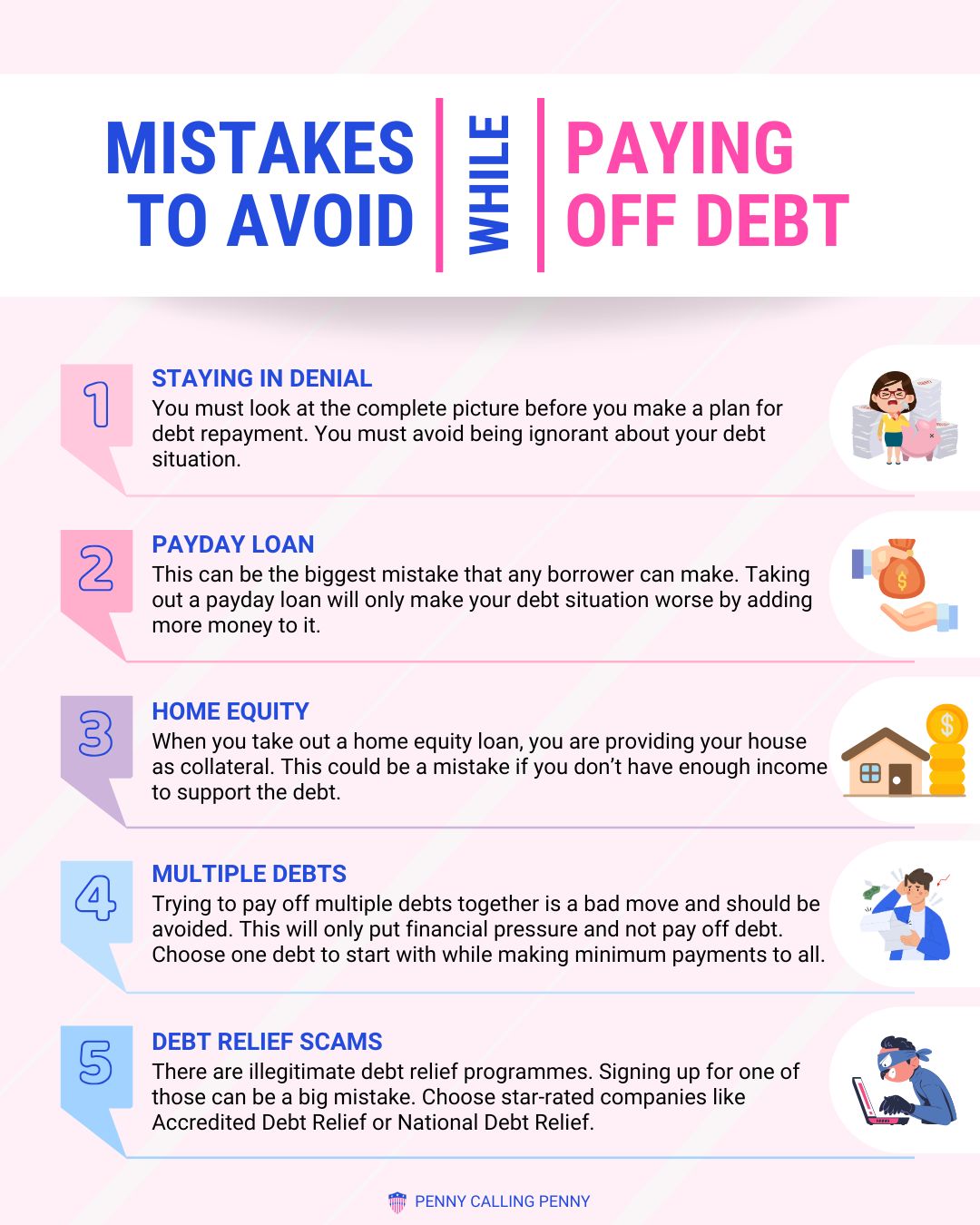
How To Pay Off Debt In Collections?
Before we move to the process to pay off debt in collections, we need to understand what debt in collections mean. Debt in collections, in simple terms, refers to a collection of debt by a third party which is different from your creditor. Your debt is sold to a debt-collecting company after you fail to make payments for several months. The debt collectors, after buying the debt, try different methods to get the payments relating to the debts from the borrower. They usually do so by either making phone calls, posting letters about the debt or sometimes even filing a lawsuit for the same.
When Does Debt Go Into Collections?
When you don’t make any payments for 30 days, you should be ready for your account to be put into an in-house collection department. This means that your debt is still under the original company, and there is a chance that you might get calls to sort out a payment.
After three to six months of failing payments, it is possible that your debt is sold to a third-party debt collection agency. And now, things might turn out to be overwhelming for you. Further, there is a chance that the debt collector might file a lawsuit against you, and if it wins, they might be given permission to garnish your income. But remember, the collectors can’t file a lawsuit if the statute of limitations has passed.
Which Debts Go To Collections?
If you haven’t paid a bill for a long time or is now past its due date, it will go to collections. Debt accounts include credit card debt, student loans, and auto loans. Other debts include medical bills, cash advances, and utility bills, including internet and phone bills. Your parking ticket can also go to collections if it is past the due date.
Steps To Pay Off Debt In Collections
1. Confirmation
Before you make any payments to a collection agency, you must confirm that the debt they are asking you to pay off is actually yours. You can check your records to make sure the balance of the debt to be paid is correct. You can also contact your original lender and ask them if you are with the right collection agency.
If you find that the debt that the collection agency is asking for is not yours, you can send a dispute letter 30 days after they have contacted you to pay off the debt. After the collection agency gets the letter, they will no longer ask for the debt repayment for the time they do not provide you with a written confirmation about the debt similar to the original bill.
2. Statute Of Limitations
The next step is to check the statute of limitations of your state of residence. The statute of limitations creates the maximum period during which the collection agency can actively collect the debt. Some states offer reactivation of the debt if the borrower contacts the collection agency or makes a partial payment. Check for bankruptcy and other means of discharging your debt and confirm your state’s rules.
3. Rights
You must be aware of your rights regarding the debt paying off in collections. Fair Debt Collection Practices Act provides for certain rules for debt collecting agencies. They can’t call you for your debt between 9 PM and 8 AM, they don’t have the right to contact you at your workplace if you have instructed them about it, they can’t let others know about your debt, plus they must be careful about harassing or threatening you about your debt repayment. You can report any incident violating such rules to the Consumer Financial Protection Bureau either online or by phone at 855-411-2372.
4. Affordability
Next, you must determine how much of your debt you can afford to repay. You must review your budget and finances to assess your financial condition. You can decide how much of your after-tax income you could use to pay off debt or settle it while ensuring that your household runs smoothly. You can also budget and determine if there are extra expenses and cut them down to put more money into debt repayment.
5. Account Deletion
If you are able to pay the entire debt or even a lump sum, you can ask the collection agency to delete your debt from your credit report. There is a chance that they might disagree. Then, you can ask if they could mark the debt as paid in full. This way, you can ensure that your credit score isn’t as bad, and you can take another loan in the future. Take your chances by asking because many collection agencies might refuse to do both.
6. Payment Plan
Of course, not everyone can pay in full or in a lump sum. You can communicate with your collection agency and ask them to create a payment plan. Make sure that this payment plan is affordable to you. Consider negotiating the number of payments that you will need to make to settle your debt.
7. Medical Debt
If you have medical debt, you could negotiate with the provider directly about making interest-free payments. You can also contact the billing office and ask them for any programs that might be applicable for you, which can eliminate some balance or even reduce it. If they don’t help, you can always ask the manager regarding the same issue.
8. Making Payments
Before you make payments, check for the payment plan. And after the agreed payment plan is reached, make the payments accordingly. You can mail a check with a return receipt as the safest option of paying the collection agency. You can be assured that you have made the payment to the collection agency with the payment receipts be it electronic or mailed.
9. Documentation
It is necessary that you document everything and anything. It would help if you documented right from the beginning. Keep a list of the agency’s name, the agent’s name, contact information, and all that is discussed with them. Create an agreement with the collection agency and have them send a copy to you. If you wish to delete the debt account from your credit history, you must make them give that in writing since verbal promises do not have any proof of completion.
10. Last Payment
After you have made the last payment, ask the debt collecting agency to give you a letter of completion of your debt from a company signatory. Make sure that the account has been updated accordingly in your credit reports. However, the changes take up to 30 days to reflect in your credit report. Make sure to have a copy of the records which indicate that you have paid off the debt for future or unforeseen situations.
How To Pay Off Debt Fast?

When the question of how to pay off debt quickly arrives, the answer might seem tricky. But actually, it is all a matter of planning and budgeting. To pay off debt fast, you can try the following steps.
1. More Than Minimum
If you budget up, you can save more. And you can pay more than the minimum towards your debt repayment every month. This way, you will be able to save more on interest. It would help if you continued to make payments more than the minimum so that your total balance reduces each month, and so does interest with it. Make sure to check for the conditions of extra payments with your creditor; some have the condition of making extra payments that go to the principal amount. Some may apply prepayment fees or penalties for the same.
2. More Than Once
You can pay off debt fast if you make payments more than once every month. This will assist you to keep track of the amount due in total. And as you will pay more frequently, your utilization ratio may decrease. Credit utilization helps in establishing your credit score. In simple terms credit utilization ratio refers to the percentage of total credit that is available which is presently being used.
3. Most Expensive Loan
If you have a high-interest debt, this will be your most expensive loan. Make a plan to pay this loan first and foremost. This will help you reduce the amount you pay in interest and decrease your total debt. As you continue to pay in descending order, you will pay off debt fast. This is also called the avalanche method.
4. Tracking The Bills
It is critical to keep track of your bills and dues. You can use automation for your payments. You can even use apps like Bill Trim or a like to help you automate your bill payments. Bill Trim can even help you lower your bills every month. This will help you avoid any overdue fees or fines, and hence, you will be able to pay off debt fast.
5. Length Of Loan
If you want to pay off debt fast, you can refinance your loan to a shorter term. This will be able to save on the total cost of borrowing. Of course if you qualify for a shorter term or lower interest rate will depend on your then situation. As you shorten the term of your loan, the payments every month are bound to increase. Keep that in mind before you make a decision.
6. Consolidation Of Debts
As mentioned before, you can consolidate your multiple debts into one. You should group high-interest debts into a loan with a comparatively lower interest rate. This will also help you keep track of your balances better and hence help you reduce overdue fees, and you could pay off debt fast.
7. Limitations On Spending
If you want to pay off debt fast, consider looking at the spending you make every month. You will be able to find some unnecessary spending. It would help if you put a limit on such spending. This will help you to get more money for your monthly payments for debt repayment. You can cut down on attending two of Taylor Swift’s concerts or subscribe to only one streaming platform instead of two. These temporary limitations on spending will help you pay off debt fast.
8. Avoiding The Collections
You might want to make sure that your debt doesn’t go into the collection. As mentioned, this will happen if you fall behind your payments for the debt for a very long time. Late payments do not only bring in more fines and fees with higher interest rates but also the risk of debt going to collections. There, you will receive debt collecting agency fees and even legal costs sometimes. To pay off debt fast, make sure you do not default on your monthly payments.
How To Come Out Of Debt Trap?

A debt trap can pose a major setback to your financial goal. Hence it is important to not only come out of debt trap or spiral but also try to avoid it. Debt trap refers to when you have more than one debt, and you keep on taking on more debts to either pay off the previous debts or take care of your everyday needs. This happens because of the number of debts and the payments you make every month; they go into the interest payment instead of the principal amount because the interest rate is so high.
If you take on a good debt, you will likely be able to manage the same. And till the time you are able to manage the debt, you are good. But if you have multiple bad debts like credit cards, there is a probability that you will fall into a debt trap if you fail to manage the debts appropriately. Because credit cards tend to have high-interest rates, and if you fail to pay the balance in one month, you get that payment in the next month, and thus, the debt spiral may begin.
Coming Out Of Debt Trap
Stop Borrowing
The first step to paying off debt if you are in a debt trap is to end your borrowing spree. You need to cut down on your credit card use because credit cards are the major cause of the debt spiral. Rather, start using a no-fee debit card or cash. You will start seeing less money going out since you will decrease the interest charged by rarely using a credit card.
Income and Expenses
When you create a budget, you become aware of your income and expenses. This will help you make changes in your spending habits. You can cut back on unrequited expenses and save more. This will help you pay off debt fast and thus help you come out of the debt trap. Some lifestyle changes, like a smaller car or eating more often, might help further to save money.
Repayment Strategy
You must decide on or create a repayment strategy. This will help you manage your finances accordingly, and soon, you will pay off debt and come out of the debt trap. As mentioned above, repayment strategies like debt snowball and debt avalanche are two of the most common and bring results. You can even use methods like debt management or consolidation. Debt relief could be tough, but it is one of the choices.
Safety Net
Create a safety net in the form of an emergency fund. This will allow you to avoid taking out debt during an emergency. For example, you can have a sudden medical emergency, but if you do not have an emergency fund, you will have to look towards credit cards or traditional forms of loans and thus start getting into the debt spiral. Make sure you can survive for several months through your emergency fund if a situation like loss of employment occurs.
Should You Use Savings To Pay Off Debt?
It is never advised that one pay off debt with one’s savings for numerous reasons, the most important of which is that savings are for emergencies, and no one should play around with the funds for emergencies.
Inconsistent Income
If you don’t have a consistent job or source of income, keeping that savings buffer is important. Thus, paying off debt with those savings will leave no cushion to fall back on.
Savings Goals
Your savings are not your emergency fund, but rather, you have been saving for other goals like buying a car. Using savings to pay off debt might derail you from those goals.
Overspending
If you are a spender and your debts, like credit card debt, are due to overspending, you should not pay off debt with your savings. Doing so would mean that you would continue to use your credit card, which would lead to an even worse condition.
Conclusion
Having debt and living in debt are two different things. When you decide to pay off debt, you are no longer living in debt from that very moment, but rather, you have debt. Paying off debt completely is a daunting job, but it is possible. With the right strategy and repayment method, with planning and budgeting, you can pay off debt fast and, yes, in one lifetime. Just stick to the plan you create and avoid taking on new debts.
Do you want to stay in debt forever, or does a debt-free life seem like your calling? Well, our article is the answer. Explore our article to assist you in your debt-paying-off journey.
Find this helpful? Share it on Pinterest, LinkedIn and Facebook for your dear ones. Also, subscribe to our newsletter to receive articles like these straight to your inbox.
Did you take our Reader Survey? If not, it only takes 1 minute and you can take our survey here.


